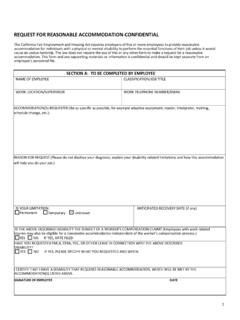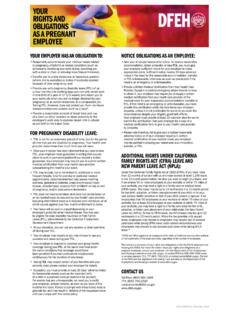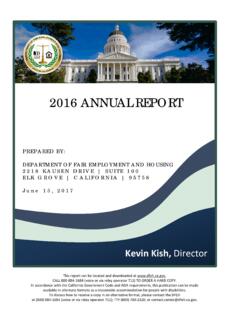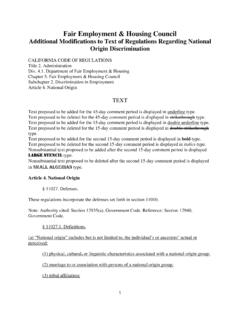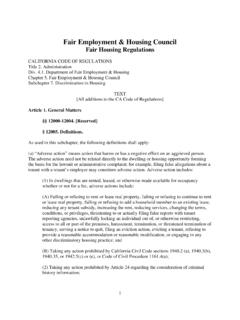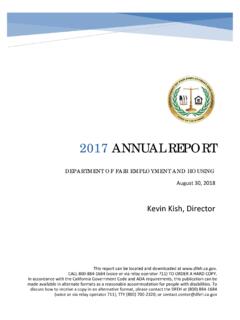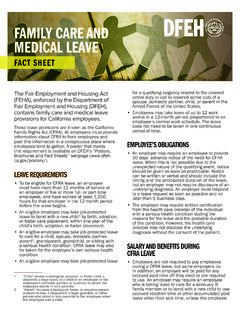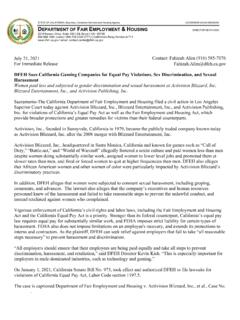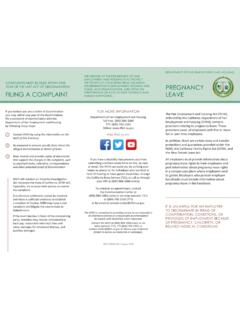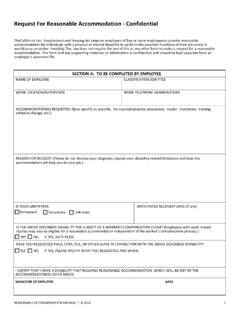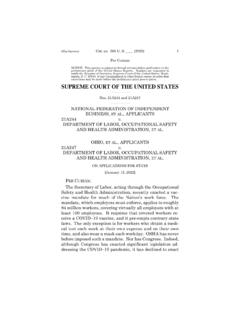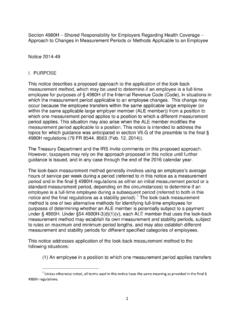Transcription of DFEH Employment Information on COVID-19
1 DFEH Employment Information onCOVID-19 PAGE 1 OF 10 THE DEPARTMENT OFFAIR Employment ANDHOUSINGTHE MISSION OF THE DEPARTMENTOF FAIR EMPLOYMENTANDHOUSING ISTO PROTECT THE PEOPLE OF CALIFORNIAFROM UNLAWFUL DISCRIMINATION IN Employment ,HOUSING AND PUBLIC ACCOMMODATIONS,AND FROMTHE PERPETRATION OF ACTS OFHATE VIOLENCE ANDHUMAN pandemic of respiratory illness caused by a new coronavirus ( COVID-19 ) currently exists in California and beyond. Governor Newsom declared a state of emergency in California on March 4, 2020. Workers and employers should adhere to the latest government guidance on how to reduce transmission of COVID-19 in the workplace, including guidance from the Centers for Disease Control and Prevention (CDC), the California Department of Public Health, and the California Division of Occupational Safety and Health (Cal/OSHA). At the same time, employers must adhere to state and federal civil rights laws, including the Fair Employment and Housing Act (FEHA).
2 For employers with 5 or more employees, the FEHA prohibits Employment discrimination and harassment on the basis of race, national origin, disability, age (over 40), and other characteristics. The FEHA also requires employers to reasonably accommodate employees with a disability, unless an employer shows undue hardship after engaging in the interactive process. DFEH is providing this guidance to assist employers and employees with frequently asked questions about how to keep workplaces safe during the COVID-19 pandemic while also upholding civil rights. This guidance is based on current public health Information and may be updated from time to time, and replaces previous guidance issued on March 20, 2020 and July 24, 2020. This guidance is for informational purposes only and does not create any rights or obligations separate from those imposed by the FEHA and other 16, 2022 / DEPARTMENT OF FAIR Employment AND HOUSINGGENERAL INFORMATIONAre civil rights laws in effect during a pandemic?
3 Yes. The FEHA prohibits employers from discriminating against or harassing employees because of race, color, ancestry, national origin, religion, age (over 40), disability (mental and physical), sex, gender (including pregnancy), sexual orientation, gender identity, gender expression, genetic Information , marital status, military or veteran status, and other characteristics. National origin includes geographic places of origin, ethnic groups, and tribal affiliations. For example, it is unlawful for an employer to refuse to hire, segregate, or send employees home because of their actual or perceived race or national origin, or because of their association (including marriage or co-habitation) with someone based on race or national origin. employers must take reasonable steps to prevent and promptly correct discriminatory and harassing conduct in the the FEHA prohibit Employment discrimination and harassment because of someone s medical condition ?
4 Yes, but the FEHA defines medical condition to mean any health impairment related to or associated with a diagnosis of cancer or a record or history of cancer or genetic characteristics. Genetic characteristics is further defined by INQUIRIES AND PROTECTIVE EQUIPMENTMay an employer ask all employees entering the workplace if they have COVID-19 symptoms?Yes. employers may ask employees if they are experiencing COVID-19 symptoms, such as fever, chills, coughing, or a sore throat. employers must keep confidential any employee health Information obtained, including keeping employee medical files separate from the employee s personnel file. See FAQ below for further Information about what an employer may disclose if an employee tests positive for COVID-19 or is quarantining because of possible an employer take all employees temperatures before allowing them to enter the workplace?
5 Yes. Generally, measuring an employee s body temperature is a medical examination that may only be performed under limited circumstances. Based on public health guidance, employers may measure an employees body temperature for the limited purpose of evaluating the risk that employee s presence poses to others in the workplace as a result of COVID-19 Employment Information on COVID-19 PAGE 2 OF 10 FEBRUARY 16, 2022 / DEPARTMENT OF FAIR Employment AND HOUSINGDFEH Employment Information on COVID-19 PAGE 3 OF 10 May an employer require employees to submit to a medical test to detect the presence of the COVID-19 virus or antibodies to the virus before permitting employees to enter the workplace?Under the FEHA, an employer may mandate a medical examination when it is job-related and consistent with business necessity. Applying this standard in light of present guidance from the CDC, and consistent with guidance from the Equal Employment Opportunity Commission, employers may require employees to submit to viral testing but not antibody testing before permitting employees to enter the workplace, as explained Testing.
6 employers may require that employees submit to viral testing in order to determine whether an employee has COVID-19 infection, before allowing an employee to enter the workplace. That is because an employee with COVID-19 is unable to perform the employee s essential duties in a manner that would not endanger the health or safety of others in the workplace even with reasonable accommodation there. employers should ensure that the testing used is accurate and reliable, and that any viral testing is part of a comprehensive plan for reducing transmission of COVID-19 in the workplace. employers should be aware that viral tests can have false-negative results and that a negative viral test does not mean that an employee will not acquire COVID-19 in the Testing. The CDC s current guidance states that [antibody] test results should not be used to make decisions about returning persons to the workplace.
7 Whereas viral testing directly tests for the presence of COVID-19 , antibody testing indirectly detects past or waning COVID-19 infection by testing for immune response. Antibody testing is less accurate and reliable than viral testing for detecting COVID-19 infection. In light of the CDC s current guidance, antibody testing does not currently meet the FEHA s requirement that a medical examination be job-related and consistent with business necessity. May an employer ask employees why they have been absent from work if the employer suspects it is for a medical reason?Yes. Asking why an individual did not report to work is not a disability-related inquiry. An employer is entitled to ask why an employee has not reported for work. If an employee discloses an illness or medically-related reason for absence, employers must maintain that Information as a confidential medical an employer require its employees to wear personal protective equipment ( , face masks, gloves, or gowns) designed to reduce the transmission of COVID-19 ?
8 Yes. An employer may require employees to wear personal protective equipment during the COVID-19 pandemic. However, where an employee with a disability needs a related reasonable accommodation ( , non-latex gloves or gowns designed for individuals who use wheelchairs), the employer should provide these, absent undue 16, 2022 / DEPARTMENT OF FAIR Employment AND HOUSINGDFEH Employment Information on COVID-19 PAGE 4 OF 10 EMPLOYEES WITH COVID-19 SYMPTOMS OR INFECTIONHow much Information may an employer request from employees who report feeling ill at work? employers may ask employees if they are experiencing COVID-19 symptoms, such as fever, chills, coughing, or a sore throat. That is because, consistent with guidance from the EEOC, an employee with COVID-19 is unable to perform the employee s essential duties in a manner that would not endanger the health or safety of others in the workplace even with reasonable accommodation there.
9 employers must keep confidential any employee health Information obtained, including keeping employee medical files separate from the employee s personnel file. See FAQ below for further Information about what an employer may disclose if an employee tests positive for COVID-19 or is quarantining because of possible an employer send employees home if they display COVID-19 symptoms?Yes. The CDC states that employees who become ill with symptoms of COVID-19 at work should leave the workplace. employers may send employees who exhibit COVID-19 symptoms home for the reasons stated in the previous FAQ. employers must provide paid sick leave and compensate the employee under paid sick leave laws. If sick leave is exhausted, employees may be entitled to other paid leave (including vacation or paid time off) or job-protected unpaid an employer send employees home if they test positive for COVID-19 ?
10 Yes. According to the CDC, [p]ositive test results using a viral test indicate that the employee has COVID-19 and should not come to work and should isolate at home. Decisions to discontinue home isolation for workers with COVID-19 and allow them to return to work may follow either a symptom-based, time based, or a test-based strategy. employers must maintain all test results as a confidential medical Information may an employer reveal if an employee is quarantined, tests positive for COVID-19 , or has come in contact with someone who has the virus? employers should not identify any such employees by name in the workplace to ensure compliance with privacy laws. If an employee tests positive for or is suspected to have COVID-19 , the employer will need to follow the most current local, state, or federal public health orders and guidance. employers should take further steps at the direction of public health authorities that may include closing the worksite, deep cleaning, and permitting or requiring may notify affected employees in a way that does not reveal the personal health-related Information of an employee.
